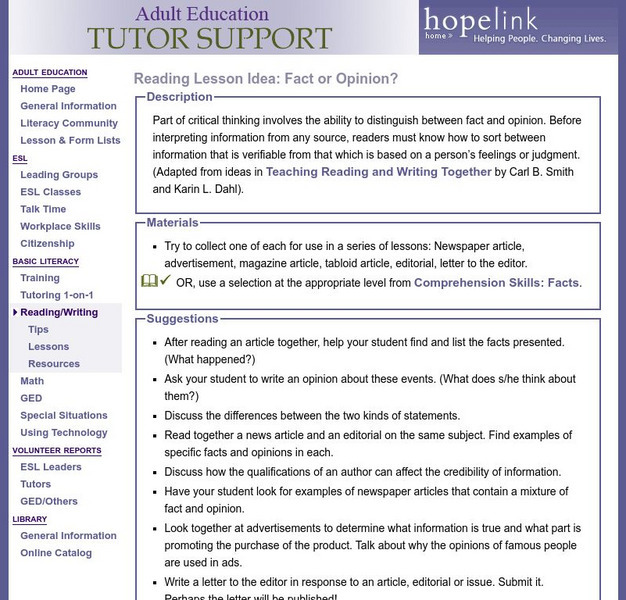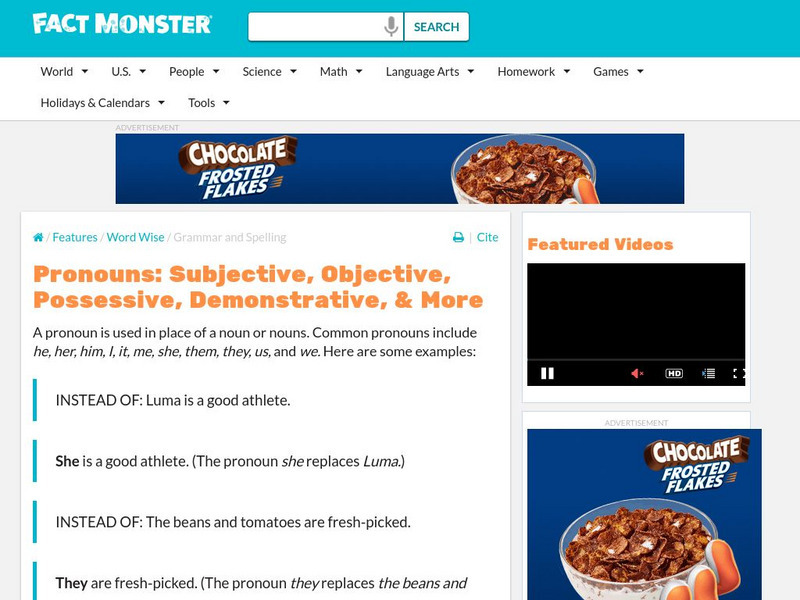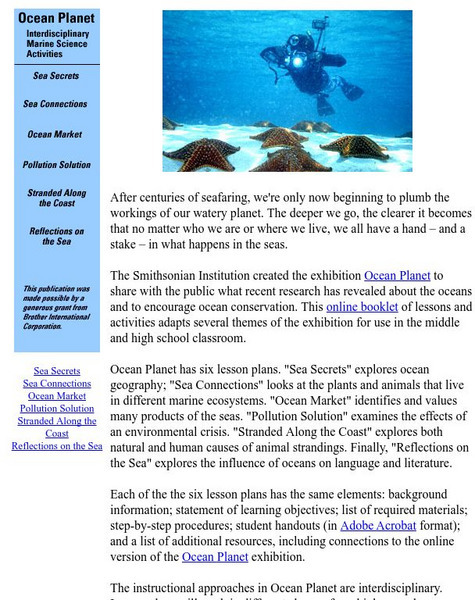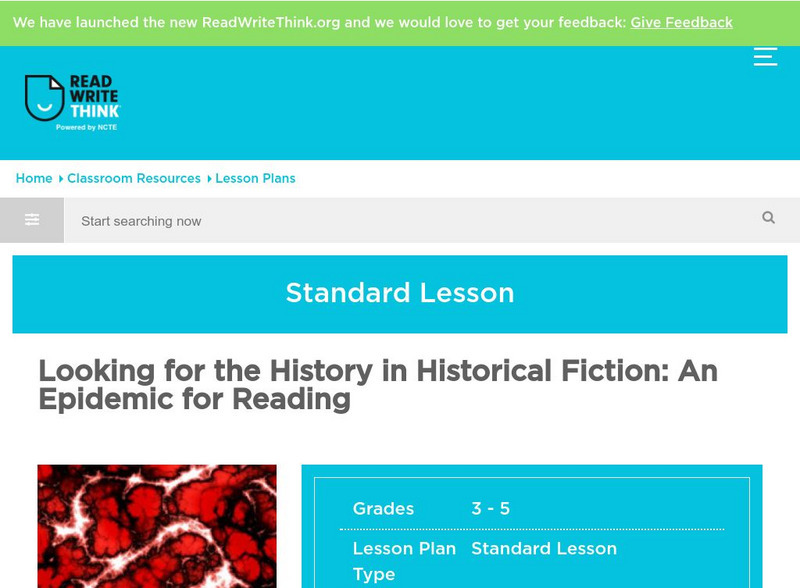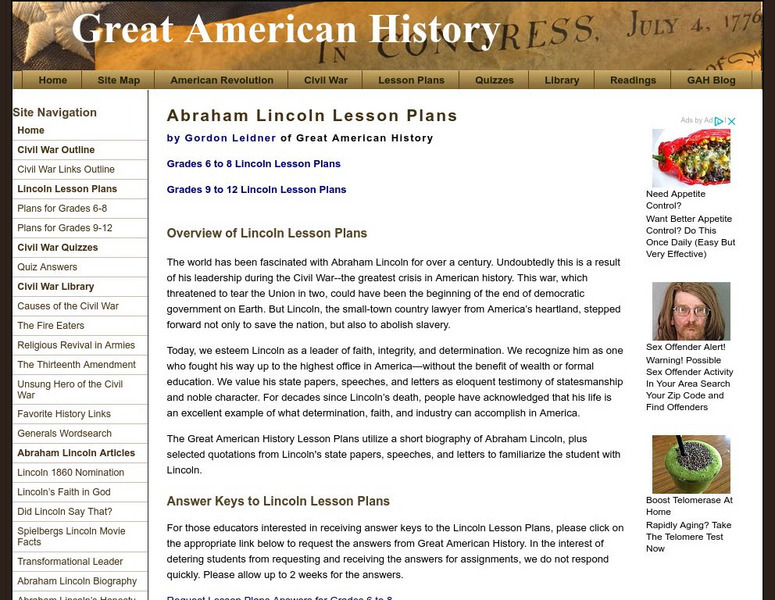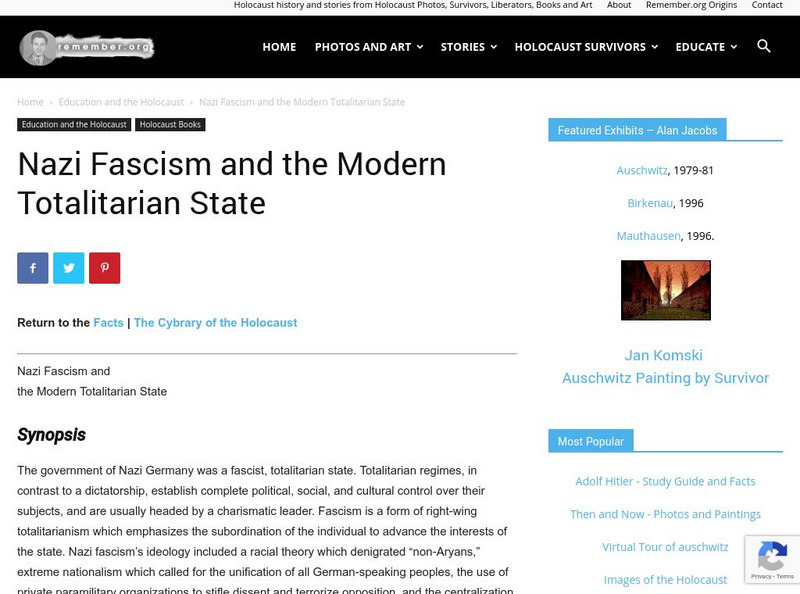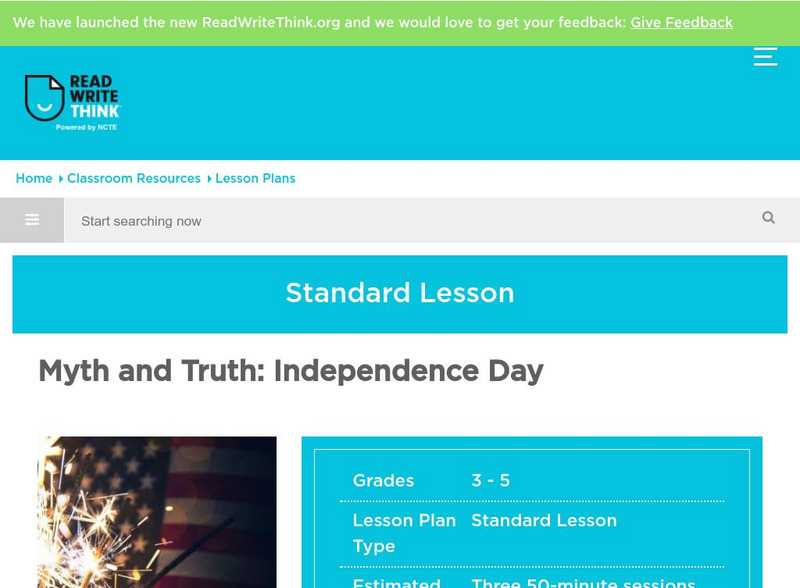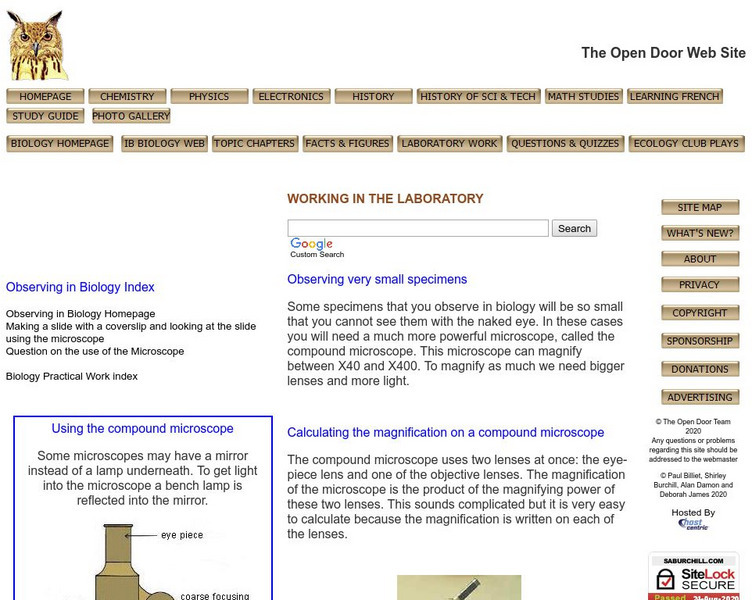ReadWriteThink
Read Write Think: Animal Study From Fiction to Facts
Contains plans for five 50-minute lessons that ask students to compare and research information about animals from fiction and nonfiction texts. In addition to student objectives and standards, these instructional plans contains links to...
Alabama Learning Exchange
Alex: The Bombing of Hiroshima Fact or Opinion
Eleventh graders will read "A Noiseless Flash" from Hiroshima, written by John Hersey with a partner and record facts (objective reporting) and opinions (subjective reporting) as given in the reading selection.
Hopelink
Hopelink: Reading Lesson Idea: Fact or Opinion?
In this lesson plan, students must learn to recognize the differences between fact and opinion.
ReadWriteThink
Read Write Think: Research Building Blocks: Notes, Quotes, and Fact Fragments
Contains plans for a lesson plan on taking notes that is part of a larger unit on researching a state symbol. It works on skills like figuring out what information is relevant and irrelevant, using a variety of sources, and paraphrasing....
Fact Monster
Fact Monster: Pronouns: Subjective, Objective, Possessive, Demonstrative, Etc.
This grammatical reference shares definitions of each type of pronoun. Each category of pronoun includes several examples. The following types of pronouns are included: demonstrative pronouns, indefinite pronouns, intensive pronouns,...
Read Works
Read Works: Washington Rides Again
[Free Registration/Login Required] An informational text about wax statues of George Washington at Mount Vernon in Virginia. A question sheet is available to help students build skills in identifying fact and opinion.
Smithsonian Institution
Smithsonian: Ocean Planet: Interdisciplinary Marine Science Activities
Smithsonian Institution presents ?Ocean Planet: Interdisciplinary Marine Science Activities?. Through this series of six interdisciplinary lessons, students will look at such things as the organisms in different marine ecosystems, the...
ReadWriteThink
Read Write Think: Zines for Kids Multigenre Texts About Media Icons
Contains plans for nine lessons that ask students to create multigenre zines for popular culture figures that include letter, persuasive, narrative, acrostic poetry, comic, and biography/autobiography writing. To accomplish this,...
ReadWriteThink
Read Write Think: An Epidemic for Reading
This lesson plan explores the facts and the history behind historical fiction. Included in the lesson plan is an overview, practice, objectives, resources, preparation, and more.
ReadWriteThink
Read Write Think: Did You Say Spiders?
Contains plans for six thirty-minute lessons that ask students to make response journals and multimedia projects about spiders. In addition to objectives and standards, this instructional plan contains links to PDF handouts and sites...
Other
Great American History: Abraham Lincoln Lesson Plans
This collection provides several suggested lesson plans appropriate for grades 6-8 and 9-12. The objective of these lesson plans is to insure that students understand the basic facts of Abraham Lincoln's life.
ClassFlow
Class Flow: Balto, the Dog Who Saved Nome
[Free Registration/Login Required] This flipchart is based on,"The Dog Who Saved Nome".. Its objectives contain word relationships, homophones, antonyms, synonyms, fact and opinion, common and proper nouns, and problem/solution.
ReadWriteThink
Read Write Think: Learning About Worms Using
Contains plans for four lessons that use the book "Diary of a Worm" by Doreen Cronin to teach about worms. In addition to objectives and standards, this instructional plan contains links to PDF handouts and sites used in the lessons as...
Other
Remember.org: Nazi Fascism and the Modern Totalitarian State
A lesson plan which includes a reading that distinguishes between the various forms of totalitarian dictatorships in reference to fascism. States the instructional objectives and chapter content covering characteristics of...
Other
U.s. Department of Health and Human Services: Teens Reporductive. E Learning Mod
This course covers the following areas: Purpose and objectives of the online course Distinguishing among values, beliefs and facts Managing personal beliefs, personal values and facts Using the Values Question Protocol Tool to answer...
TeachEngineering
Teach Engineering: What Do Bread and Beer Have in Common?
Young scholars are presented with information that will allow them to recognize that yeasts are unicellular organisms that are useful to humans. In fact, their usefulness is derived from the contrast between the way yeast cells and human...
BBC
Bbc: History: The American War of Independence
This account of the American War of Independence looks at the war objectively, acknowledging that it was, in fact, both a civil war and a world war. The author begins with the prelude to the war, discusses the theater of war and the...
Better Lesson
Better Lesson: Bat Versus Bird
Young scholars compare and contrast two animals to recall learned information so they can share two facts using the informational text "The Best Nest". Included is a video explanation, a printable graphic organizer, samples of student...
Internet Encyclopedia of Philosophy
Internet Encyclopedia of Philosophy: Natural Law
Review this site for the definition of "natural law" based on varying theories with respect to morality in determining the authority of legal norms. Contents of the writing cover Two Kinds of Natural Law, Conceptual Naturalism,...
ReadWriteThink
Read Write Think: Myth and Truth Independence Day
Contains plans for three lessons that explore the fact and fiction surrounding the Declaration of Independence and Independence Day. In addition to objectives and standards, this instructional plan contains links to resources used in the...
Open Door Team
Open Door Web Site: Biology: Calculating Magnification on a Compound Microscope
Learn how to calculate the total magnification of a microscope on this concise site. Links to making a slide, questions on the use of the microscope, and other related microscope topics are included on this site.
Curated OER
George Washington
This account of the American War of Independence looks at the war objectively, acknowledging that it was, in fact, both a civil war and a world war. The author begins with the prelude to the war, discusses the theater of war and the...


